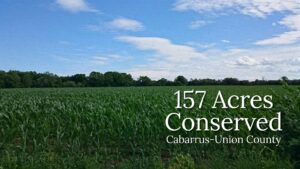
by Crystal Cockman
June 22, 2017
“We abuse land because we regard it as a commodity belonging to us. When we see land as a community to which we belong, we may begin to use it with love and respect.” – Aldo Leopold
The LandTrust for Central NC launched our new youth initiative entitled the Leopold Society, after the father of conservation, Aldo Leopold. The Leopold Society enlightens youth participants from grades 6 to 12 on the natural world and conservation issues. Participants develop conservation techniques, outdoor skills, and hands-on natural resource stewardship and service. The long-term goal of the Leopold Society program is to instill a lifelong love of nature in youth participants that will translate into positive action as adults.
But just who was Aldo Leopold? An American author, philosopher, scientist, ecologist, forester, conservationist, and environmentalist, Leopold is considered by many to be the father of wildlife ecology and the United States’ wilderness system. Best known for his book A Sand County Almanac (1949), which has sold more than two million copies, this book details Leopold’s “land ethic,” which calls for an ethical, caring relationship between people and nature.
Rand Aldo Leopold was born in Iowa on January 11, 1887. Even from a young age, he was always an outdoorsman. He decided to attend Yale University to study forestry. His first job was with the U.S. Forest Service in the Arizona and New Mexican territories. He developed the first comprehensive management plan for the Grand Canyon, and he proposed Gila Wilderness Area, the first wilderness area in the Forest Service System.
In 1924, he accepted transfer to the U.S. Forest Products Laboratory in Madison, Wisconsin and became an associate director. In 1933, he was appointed Professor of Game Management in the Agricultural Economics Department at the University of Wisconsin–Madison, the first such professorship of wildlife management. He lived close to the University with his wife and children, who followed in his footsteps as teachers and naturalists.
He purchased eighty acres in the sand country of central Wisconsin. The once-forested region had been logged, swept by repeated fires, overgrazed by dairy cows, and left barren, and it was there he wrote his best-selling book, A Sand County Almanac (1949), finished just prior to his death.
Much like Leopold’s Almanac, The LandTrust for Central North Carolina’s Leopold Society program includes a “conservation passport” with requirements for the participants to complete various activities related to the outdoors, such as hiking, paddling, hunting, fishing, and orienteering, in their own “land ethic journey.” This wide array of activities allow participants to engage in all facets of conservation and outdoor recreation, developing their own relationship with the natural world. Along with the skills developed, participants are asked to complete a service project to further cultivate the participant’s role in conservation. The service project, such as trail maintenance, school recycling program, new hunter mentorship program, or native plants gardens can be completed independently or as part of a class. As they complete activities, participants will receive stamps and patches to recognize their achievements. Finally, The LandTrust hopes to award college scholarships to qualifying high school seniors that complete the program.
To learn more about the Leopold Society program, contact Mikey at michael@landtrustcnc.org or 704-647-0302.